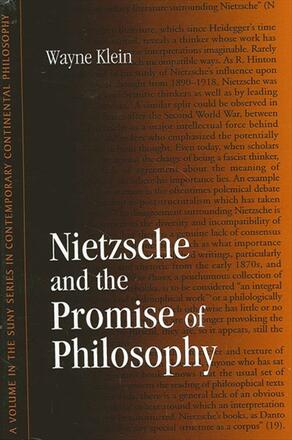
Nietzsche and the Promise of Philosophy
Alternative formats available from:
Examines the role of language in Nietzsche's thought, including the relationship between style and subjectivity, the semiological underpinnings of his theory of tragedy, his naturalism, and his theory of language and rhetoric.
Description
This book questions the consensus about the meaning and importance of Nietzsche's philosophy that has developed in the United States and Britain during the last thirty years and reestablishes close reading as the ground of interpretation. Arguing that there is greater continuity in Nietzsche's thought than is usually recognized, Klein focuses particularly on the genesis and nature of Nietzsche's theory of language and rhetoric, exploring the relationship between his early theory of language, expressed in The Birth of Tragedy, and the canonical writings of the late 1880s. Other topics considered include the relationship between style and subjectivity, the semiological underpinnings of Nietzsche's theory of tragedy, and Nietzsche's naturalism. This book is united by the conviction that Nietzsche's understanding of language is an essential part of his thought, and that whatever their explicit themes, Nietzsche's texts constitute a sustained reflection on the nature of reading and writing, which forces the reader to put into question conventional views about how philosophical texts should be interpreted. By focusing on this aspect of Nietzsche's thought, Klein provokes readers into taking a second look at Nietzsche, revisiting questions that have long been considered closed and posing new ones in the process.
The author powerfully combines careful textual exegesis with a broad historical view of Nietzsche's philosophy. Unlike many contemporary works of Nietzsche scholarship that seek to provide a general overview of Nietzsche's thought, the book is largely devoted to sustained, detailed readings of some of the central texts of the Nietzschean canon, allowing the reader to gain a greater understanding of the subtleties and nuances of these texts within the context of the larger philosophical issues they raise.
Wayne Klein is Assistant Professor of Philosophy at Xavier University in New Orleans.
Reviews
"Klein's reading offers sound contextualizations of Nietzsche's early thought … [His] own style of close textual exegesis of the original German should also be applauded for articulating many important distinctions and nuances within Nietzsche's texts which are not visible in English translation. " — New Nietzsche Studies
"Wayne Klein provides careful readings of Nietzsche's texts that challenge some long-held beliefs in Nietzsche scholarship. In both its style and content, this book is an important contribution. " — James J. Winchester, author of Nietzsche's Aesthetic Turn: Reading Nietzsche After Heidegger, Deleuze, Derrida